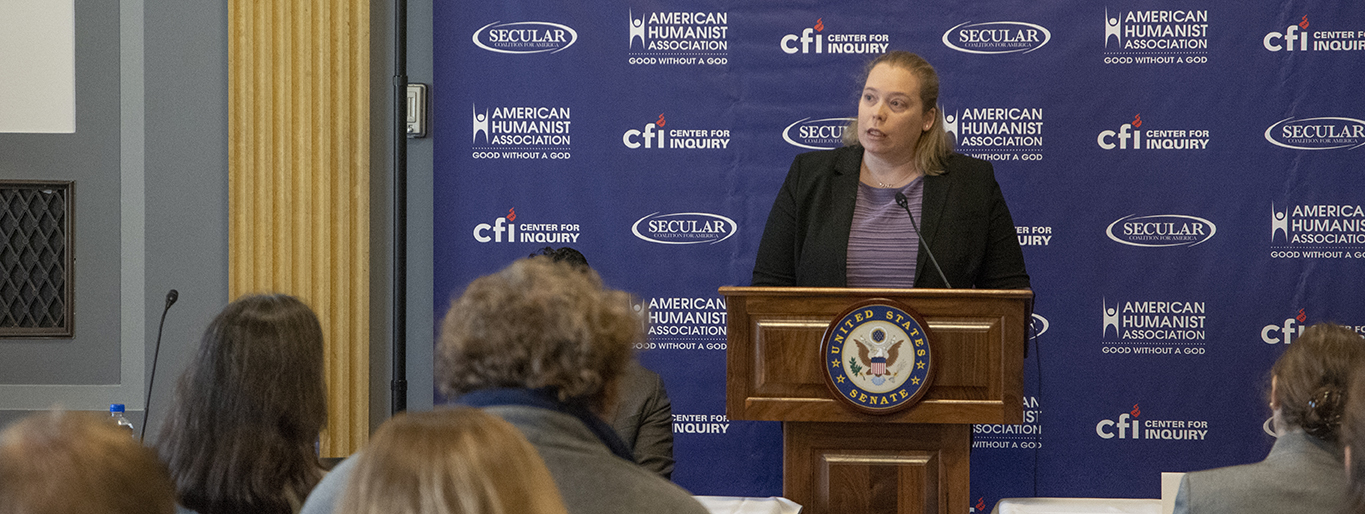 From BJC staff reports
From BJC staff reports
Organizations are coming together to oppose blasphemy laws around the world, which – at their core – stifle religious expression.
On October 16, BJC Associate General Counsel Jennifer Hawks participated in a Senate briefing opposing blasphemy laws alongside a variety of religious, government and secular leaders sharing different perspectives on the problem. The briefing was organized by the American Humanist Association, Center for Inquiry and Secular Coalition for America. Hawks highlighted stories of Christian persecution under laws that criminalize blasphemy.
Although the details vary by country, a blasphemy law seeks to punish those who insult, offend, demean or denigrate religion (including religious doctrines, important figures, symbols and texts) with fines, imprisonment or even the death penalty. Approximately one in three countries has at least one blasphemy law on the books.
“At their core, blasphemy and apostasy laws are a dangerous blending of the institutions of religion and state,” Hawks said during the briefing. She also reminded the crowd why Baptists are strong supporters of freedom for all, pointing out that Baptists were once a persecuted religious minority.
“Marginalized Baptist pastors fought not only for their own religious freedom [in Colonial America] but consistently spoke of the need for Jewish, Muslim, atheist and all of our neighbors to be free to worship God, or not, as they feel led,” Hawks said. “As an ordained minister, I would argue that critically thinking about religion is what keeps religion vital and applicable to our daily lives.”
Knox Thames, the special advisor for religious minorities in the Near East and South/Central Asia at the U.S. Department of State, explained why the United States opposes blasphemy laws. “Blasphemy laws, and the often related laws of apostasy, are increasingly common tools used by governments in oppressing freedom of belief and expression,” he said, noting that some individuals also cite these laws as a pretext to incite violence.
Thames also spoke of the recent Potomac Declaration, an action plan to protect religious freedom around the world, and noted that it specifically calls on countries to repeal such laws.
The list of countries with blasphemy laws includes countries generally associated with human rights restrictions, such as Pakistan, Iran and Russia; but it also includes frequent American allies, such as Canada, Germany and Israel. Several smaller countries, including Antigua, Comoros and San Marino, also have them.
Elizabeth Cassidy, who serves as the director of international law and policy at the United States Commission on International Religious Freedom (USCIRF), shared facts on blasphemy laws. She said most of them are vaguely worded, part of the criminal code and do not require the showing of intent. “So, basically, you can be charged with a crime without intending to have committed a crime,” she added.
While some countries do not enforce their blasphemy laws, Cassidy explained that having them on the books is problematic because oppressive regimes point to other countries – particularly western democracies
– to justify their own laws.
As an example, the last person in Ireland to be convicted of violating a blasphemy law was in 1703 (before the country was independent). However, Aasiya Noreen spent eight years on death row in Pakistan for violating a blasphemy law before her conviction was overturned in October 2018.
Pakistan, however, will no longer be able to use Ireland to justify its blasphemy law, as Irish citizens voted to repeal it on October 26. This repeal effort had been supported by various groups, including the Irish Catholic Bishops who called the provision “largely obsolete.”
The BJC is currently working with religious and secular partners to fight blasphemy laws and support international repeal efforts. Thames said the government appreciates the partnership of non-government organizations and members of Congress as they work to encourage reforms around the world.
This article originally appeared in the November/December 2018 issue of Report from the Capital. To view the PDF online, click here.




